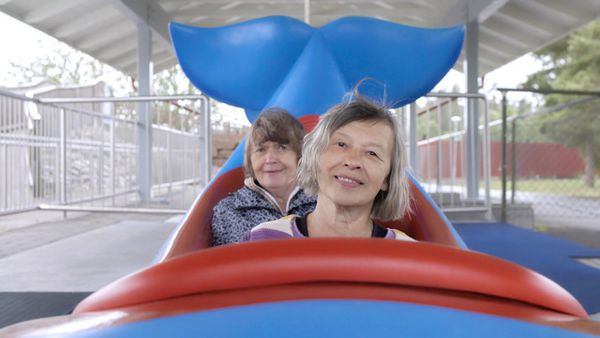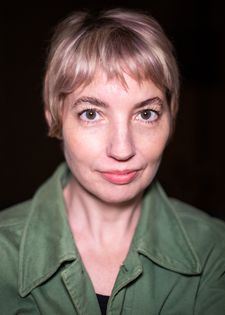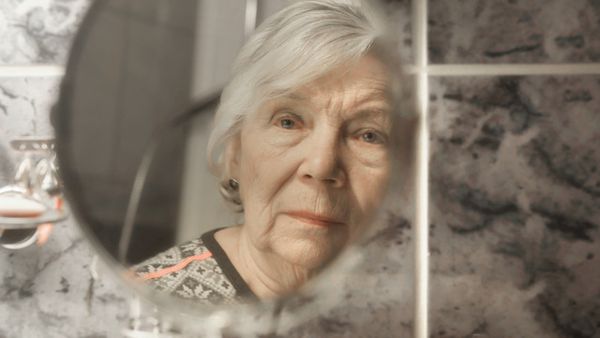 |
| Kari and May. Maria Fredriksson: 'I really wanted to find the black and white truth. But then I realised that's not what this film is about' Photo: Courtesy of Ballad Film |
From the start of your film you emphasise the level of artifice. It’s quite unusual for a documentary to draw attention to that. At what point did you decide that you wanted to make the audience aware of that?
Maria Fredriksson: It was absolutely not from the beginning. And I'm not one of those filmmakers that wants to participate in front of the camera, or even with voice over. I prefer to take a step back in my films. But I started to do the reconstructions with them the first time I filmed them, because I wanted to do this technical breakdown, or whatever you want to call it, of the ‘miracle'. But it became clear that I had to involve myself when I started to record the phone calls. That wasn't the plan from the beginning but then I asked them, “Is it okay, if I record?” because there was so much happening between filming, because, of course, I couldn't film them every time something happened. And so first, I started to record the phone calls just for me to be able to keep track of what was actually happening in this story, because there was so much and my head was exploding. Then, and then when we came to this, the scene [much later in the film] when I interrupt them, I realised that that had to be in the film for the audience, because I think I had to ask those questions that the audience would have in their head at that point, watching the film.
And because I had to be in the film at that point, I had to also set myself there from the start. Otherwise, it would be too strange, the director interrupting an hour and 20 minutes or so in, in the film. So that's why we decided to have that from the start. Of course, it could have been just a voiceover or something. But it was also because of what we learned so early in the film about how they got this message from God through this fruit painting and everything - that is so strange, I mean, the strangest thing someone can tell you really. So, for me, it was also for the audience to get to know them as characters and to love them. If I was just there telling you about it or just using interviews, they might come across a bit odd but now I think you love them when they’re presented like this.
This is your first feature. What made you decide that this was the story that you wanted to take on in the first place?
 |
| Director Maria Fredriksson: 'I think it is very beautiful that they all are they all think that this is a very truthful version of what happened' Photo: Daniel Milton |
But when they called me and told me about this miracle, I was like, “Okay, I will go with this story’. But I didn't know, of course, what was going to happen? And I was talking to my producer Ina Holmqvist very early on after I met them and she said, “But how are you going to make this film, because you're a documentary filmmaker and the story, the miracle, has already happened?” And that was what the film was supposed to be about. I knew that I didn't want to make fiction and I didn't want to do a drama because I feel like it's not authentic. I wanted to do an authentic film. So that's why I also tried with this sort of crime scene technical breakdowns. But yeah, I don't know, I didn't know what film I was doing until it was here. But I started filming them in December 2018. It might be a great film now but at the start, it was something completely different.
You seem quite interested in what shapes identity, and not just the story that you're telling, but also the stories that people tell themselves. This film is a lot about the creation of narrative that these women are going through.
MF: Yes. I'm very interested in that. And that is, I guess, why I've made earlier films about older women because they have so much to tell about who they are and who they became because of things that have happened in life. That's why I thought this was super interesting, because Olaug had to sort of redefine her identity at the age of 80. So it's absolutely a film about that. But I think it's mostly a film about finding your own truth and deciding on what truth you can handle - the stories about who you are and who you choose to be.
There’s a point where Olaug is almost being controlled by external forces. Then there's a shift where you sense that, by hook or by crook is determined to take back control of this sort of narrative of her existence. How hard was it to keep everybody on side as filming was going on because I get a feeling sometimes it's almost like they're becoming hostile witnesses in that sense?
MF: It was super-hard because I never want to take sides. And because when they didn't speak to each other any more, they all asked me to, you know, have their truth as the only truth, so to speak. But I made it very clear to them that I am, I am not taking sides, and I'm listening to all of you. But it was really difficult in the editing and stressful for me to make a film that could make all of them happy.
There must have been a point where you began to wonder what on earth you'd got yourself into. What starts off as a kind of interpersonal family, upbeat film becomes almost a true crime documentary.
MF: Yes, I became this crazy investigator. The wall in our office was like this police detective wall. I've had many sleepless nights, and my family has been very involved in this. I've been living this with them for four-and-a-half years now and it has been a constant part of my life. And of course, I've been haunted by what happened to Lita and her story and felt a responsibility to make this story something that I hope that she would accept also.
Maybe the fact that this was your feature debut, meant you were more flexible, because, you're not gauging it against another feature that you did. In a sense, you're sort of in the moment, and maybe that was helpful for you to be able to go with the flow.
MF: Yeah, that's probably right. I wasn't bound by how I should do this. I was just doing it the way I felt inside was the way to do it. But, of course, there were a lot of questions in the editing on what to include and how to build a story and how to not make it just a true crime. Because in a true crime, you also tend to want more answers than you get in this one. To keep it one film, even though it's a film that is a roller coaster, so it's still the same, we're still in the same universe.
How hard was it for you to keep an open mind about all of this, because things are happening constantly and it must be quite tempting to form your own opinion or even to make judgments. As a documentarian, obviously you don't want to do that but still, I wonder how difficult it was to find that balance for yourself as well?
MF: It was very difficult. Because every time me and Pia Lehto, the cinematographer, went filming, we went with a goal to get something specific, as you do as a documentary filmmaker. And when we came back, it was always with something else. Of course, I wanted to find all the answers in this story. I really wanted to find the black and white truth. But then I realised that's not what this film is about. And it's definitely not about my truth, or my opinions, I'm just here for them. They have very different beliefs about what the truth is for them and I have to just take a step back and not shovel my truth into someone's throat in the end, because that is absolutely not my job.
It's the truth you can handle that you choose to live with. At some point, I also felt responsible for the audience to give them all the answers, that I'm throwing out so many questions there.But then I realised that, of course, the audience should also get the opportunity to have their truth because that's super important to give them the that same opportunity.
How was it to show them the film
MF: I've had separate screenings, so I haven't showed it for them all together because that would be too much. They all love the film and what is most fascinating, I think, is that Kari and May, when I screened it to them, said, “We love the film, this is absolutely our truth”, but will Olaug be fine because this is our version of what happened. And then when I screened it for Olaug, she said, “I love the film, but are Kari and May really happy with this version because this is my truth”. So I think it is very beautiful that they all are they all think that this is a very truthful version of what happened.
What’s next for you?
MF: The latest is, they have asked me if maybe we should try to find a private investigator after all and see what happens, but I don't think that is the plan for now. But you never know with this story. But I have an idea that I'm starting on and it's also about what is true or not, and different versions of what to believe. It’s a totally different story but the same theme.






















